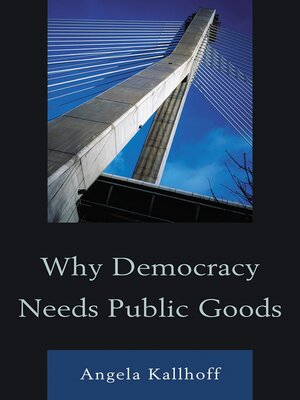
Sign up to save your library
With an OverDrive account, you can save your favorite libraries for at-a-glance information about availability. Find out more about OverDrive accounts.
Find this title in Libby, the library reading app by OverDrive.



Search for a digital library with this title
Title found at these libraries:
| Library Name | Distance |
|---|---|
| Loading... |
Why Democracy Needs Public Goods presents a new theoretical perspective on public goods based on a framework of political philosophy. Angela Kallhoff responds to negative narratives on public goods that point out their role in causing market failures, their cost on public finance and in regulation, and their irregular and sometimes negative effects on social interaction. She instead provides a normative approach arguing for their role in supporting democracies at critical points by providing the basis for a public forum through public space and infrastructure, improving social inclusion through public healthcare and education, and fostering a sense of national identity.
This book also features a comprehensive description of other arguments and theoretical approaches to public goods, as well as assessing the classical economic approach of collective action theory and counter arguments from the so-called libertarian camp. Kallhoff also analyzes the problems of regulatory frameworks and the normative issues resulting from the need to support by means of public finance. These perspectives will be most significant to political philosophers and policymakers, though the language used and the examples given will make Kallhoff's arguments comprehensible to non-experts as well.
This book also features a comprehensive description of other arguments and theoretical approaches to public goods, as well as assessing the classical economic approach of collective action theory and counter arguments from the so-called libertarian camp. Kallhoff also analyzes the problems of regulatory frameworks and the normative issues resulting from the need to support by means of public finance. These perspectives will be most significant to political philosophers and policymakers, though the language used and the examples given will make Kallhoff's arguments comprehensible to non-experts as well.







